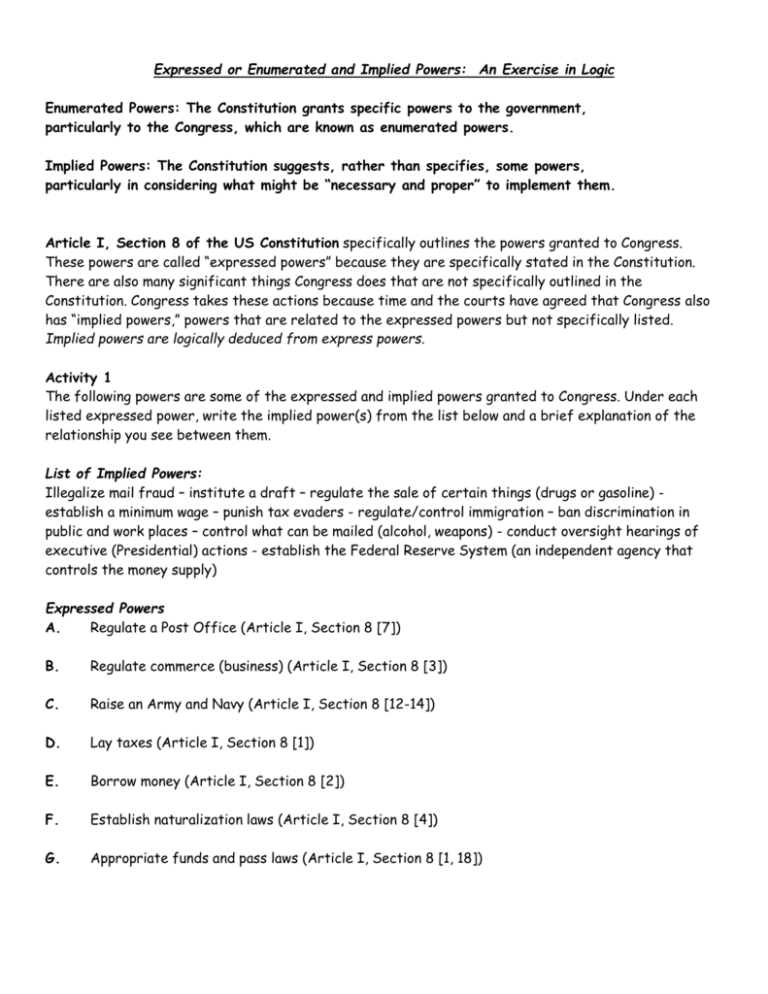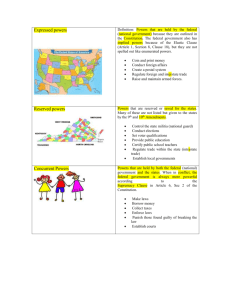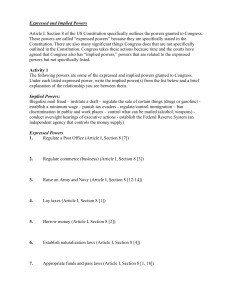Expressed and Implied Powers
advertisement

Expressed or Enumerated and Implied Powers: An Exercise in Logic Enumerated Powers: The Constitution grants specific powers to the government, particularly to the Congress, which are known as enumerated powers. Implied Powers: The Constitution suggests, rather than specifies, some powers, particularly in considering what might be “necessary and proper” to implement them. Article I, Section 8 of the US Constitution specifically outlines the powers granted to Congress. These powers are called “expressed powers” because they are specifically stated in the Constitution. There are also many significant things Congress does that are not specifically outlined in the Constitution. Congress takes these actions because time and the courts have agreed that Congress also has “implied powers,” powers that are related to the expressed powers but not specifically listed. Implied powers are logically deduced from express powers. Activity 1 The following powers are some of the expressed and implied powers granted to Congress. Under each listed expressed power, write the implied power(s) from the list below and a brief explanation of the relationship you see between them. List of Implied Powers: Illegalize mail fraud – institute a draft – regulate the sale of certain things (drugs or gasoline) establish a minimum wage – punish tax evaders - regulate/control immigration – ban discrimination in public and work places – control what can be mailed (alcohol, weapons) - conduct oversight hearings of executive (Presidential) actions - establish the Federal Reserve System (an independent agency that controls the money supply) Expressed Powers A. Regulate a Post Office (Article I, Section 8 [7]) B. Regulate commerce (business) (Article I, Section 8 [3]) C. Raise an Army and Navy (Article I, Section 8 [12-14]) D. Lay taxes (Article I, Section 8 [1]) E. Borrow money (Article I, Section 8 [2]) F. Establish naturalization laws (Article I, Section 8 [4]) G. Appropriate funds and pass laws (Article I, Section 8 [1, 18]) Article II of the Constitution covers the Presidency. This article as well presents expressly worded language about the job and responsibilities of the Presidency. What, on the other hand, is implied from these expressed Presidential powers? The following powers are some of the expressed and implied powers granted to Congress. Under each listed expressed power, write the implied power(s) from the list below and a brief explanation of the relationship you see between them. 1. Draft striking miners into the army 8. Use military forces along the border with 2. Intern Japanese Americans in wartime Mexico to interdict drug traffickers 3. Claim executive privilege during 9. Order the desegregation of armed services Watergate hearings 10. Order striking air traffic controllers back 4. Order troops to the Korean Peninsula to work without a declaration of war 11. Fire the attorney general 5. Order warrantless wiretapping of 12. Claim total control over the carrying out of Americans during the War on Terror laws (unitary theory), like No Child Left Behind 6. Fire a reckless but popular general in the 13. Order a nuclear strike on a nearby island middle of a war that houses enemy nuclear missiles 7. Prepare and present a budget for Congress Expressed Powers A. The executive power shall be vested in a President of the United States of America B. The President shall be commander in chief of the Army and Navy of the United States, and of the militia of the several states, when called into the actual service of the United States C. He shall have power to grant reprieves and pardons for offenses against the United States, except in cases of impeachment D. He shall take care that the laws be faithfully executed E. He shall from time to time give to the Congress information of the state of the union, and recommend to their consideration such measures as he shall judge necessary and expedient F. Before he enter on the Execution of his Office, he shall take the following Oath or Affirmation:-''I do solemnly swear (or affirm) that I will faithfully execute the Office of President of the United States, and will to the best of my Ability, preserve, protect and defend the Constitution of the United States.'' G. As well: Inherent powers * Powers said to be inherent to the idea of government * Include power to control national borders, acquire new territories, defend the state from revolution and rebellion, protect the right of sovereignty








